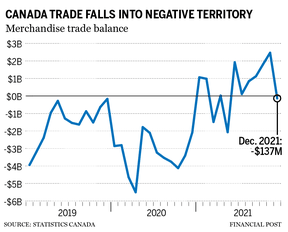Surging smartphone imports signal supply bottlenecks are starting to give way

Kevin Carmichael: Trade data support expectations that the Bank of Canada will raise interest rates in March

Article content
Imports surged to a record in December, suggesting companies and logistics experts are starting to work through the various supply issues that have plagued the recovery from the COVID recession.
Advertisement
Story continues below
This advertisement has not loaded yet, but your article continues below.
Article content
Statistics Canada reported Feb. 8 that goods worth $57.7 billion arrived from abroad in the final month of 2021, an increase of 3.5 per cent from November, led by a push from electronics dealers to get product in stores in time for Christmas. The value of exports dropped 0.9 per cent from a record the previous month, to $57.6 billion. The gap between exports and imports represented the first monthly trade deficit since May.
The data reinforce expectations that the Bank of Canada will raise interest rates in March, as the economy appears to have plenty of momentum to push through the headwinds created by the fifth wave of COVID-19 infections. The third consecutive monthly increase in imports implies strong domestic demand, which will put upward pressure on inflation that is running too hot for the central bank’s comfort. The Bank of Canada said last week that year-over-year increases in the consumer price index (CPI) will exceed five per cent this quarter, well outside its maximum tolerance of three per cent.
Advertisement
Story continues below
This advertisement has not loaded yet, but your article continues below.
Article content

Some of the demand that drove an acceleration in the recovery over the second half of the year is being fuelled by exporters, who are enjoying an unprecedented run thanks to surging commodity prices. Canadian companies sent goods worth a record $637 billion overseas in 2021, exceeding the previous record in 2019 by seven per cent. When adjusted for prices, exports still were 5.4 per cent below 2019 levels. Still, companies are paid in real dollars, and last year’s receipts suggest exporters should have a windfall from which to invest, hire, increase pay, and/or return to shareholders.
Canada recorded a trade surplus for the first time since 2014 last year. The gap between exports and imports was $6.6 billion, the largest since 2008.
Advertisement
Story continues below
This advertisement has not loaded yet, but your article continues below.
Article content
Positive news from the trade front is discordant with headlines that have tended to focus on sporadic reports of empty shelves, bottlenecks at ports along the Pacific Ocean, and climate disasters that wiped out crops.
The unprecedented stimulus that governments and central banks deployed to offset the economic effects of the pandemic caught suppliers flat-footed. They weren’t ready as orders piled up because they had prepared for a severe recession. Computer chips were especially scarce, and more recently food prices have jumped because poor harvests left the world short on staples. The pandemic has compounded problems, as factories and shipping companies have been chronically short staffed due to illness and quarantines.
Advertisement
Story continues below
This advertisement has not loaded yet, but your article continues below.
Article content
As those sundry disruptions fade, supply and demand should rebalance, which would take the heat out of inflation. The Bank of Canada predicts year-over-year increases in the consumer price index will ease to values of around three per cent as the year wears on, and drift back towards the central bank’s target of two per cent in 2023.
There was some evidence of such a trajectory in the trade numbers. Imports of electronics and electrical parts surged 16.2 per cent from November to $7 billion, a record. All of the subcategories of that classification posted increases, none more so than “communication, audio and video equipment,” which climbed an outsized 52.1 per cent. That group is dominated by smartphones, which makers had been struggling to get to market for much of 2021, Statistics Canada said. Even with the huge increase in December, annual imports from the category were down 5.4 per cent compared with 2019, the agency said.
Advertisement
Story continues below
This advertisement has not loaded yet, but your article continues below.
Article content
“It looks like supply chain issues eased somewhat on that front,” Shelly Kaushik, an economist at Bank of Montreal, said in a note to clients. “Auto trade also benefited from lessening logistical constraints, allowing Canadian plants to run at higher production levels than usual through the holidays.”
-

What your fruit has been through: A green grape’s journey through a global supply chain on edge
-

Justin Trudeau blasts trucker protest as key Ambassador Bridge to U.S. shuts down
-

Coffee shops are raising prices as beans become more costly, workers demand higher wages
Imports of motor vehicles and parts, the production of which also has been impeded by the chip shortages, rose 5.1 per cent to $8.9 billion, the highest level since February 2020. Automobile makers appear to have kept factories working straight into the holidays, a period when production typically slows, Statistics Canada said. In 2021, the decline in auto production from November to December was smaller than usual, resulting in seasonally adjusted gains.
Advertisement
Story continues below
This advertisement has not loaded yet, but your article continues below.
Article content
Exports dropped from a high level because oil prices dipped, and coal shipments were impeded by the British Columbia floods. The volume of oil leaving Canada actually increased for the second consecutive month because of increased pipeline capacity.
A downbeat in the report was that consumers were keener to get their hands on new smartphones than companies were to invest. Jocelyn Paquet, an economist at National Bank, noted that inflation-adjusted imports of machinery and equipment, a proxy for investment intentions, dropped in the fourth quarter. The drop “bodes ill for investment spending” in the fourth quarter, she said.
• Email: [email protected] | Twitter: carmichaelkevin
Advertisement
Story continues below
This advertisement has not loaded yet, but your article continues below.








